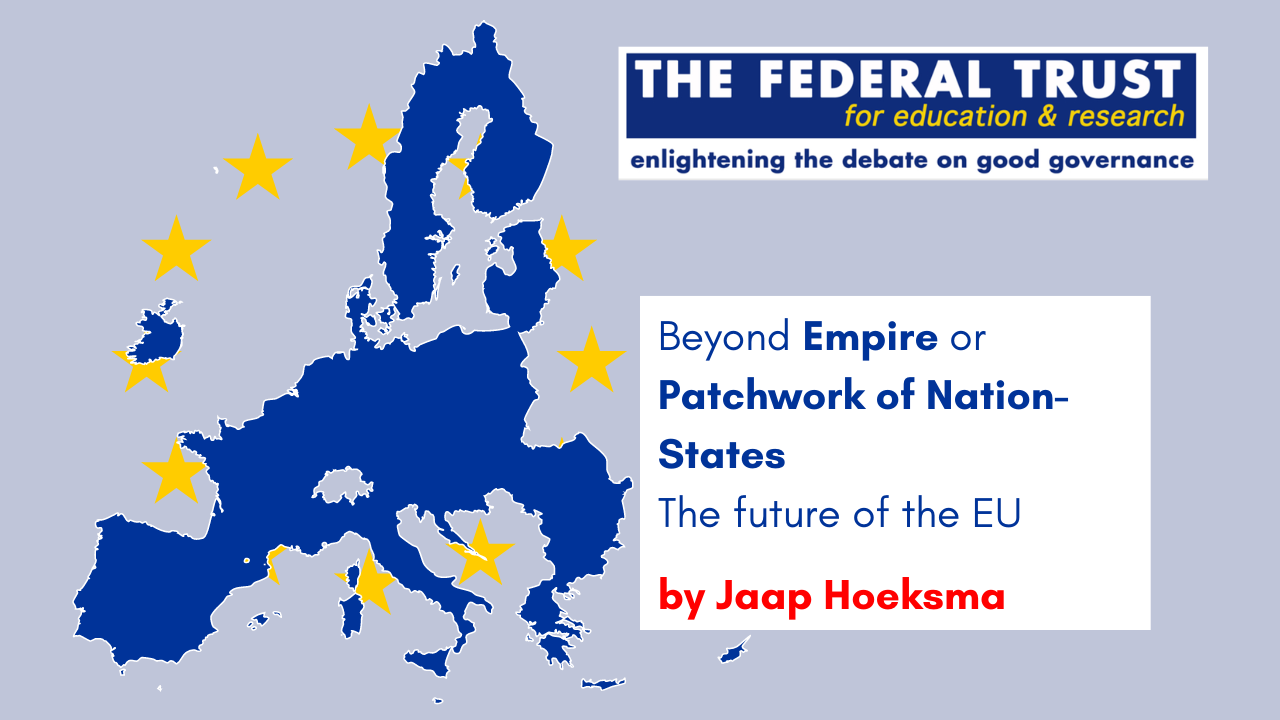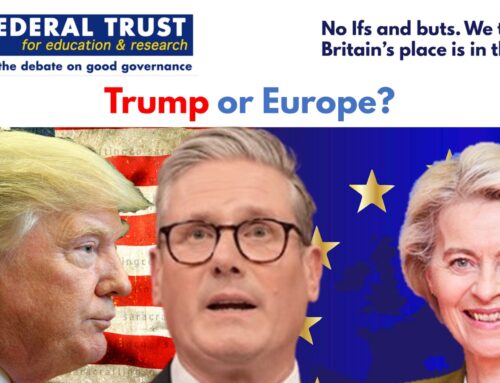After the excitement of the EP 2024 elections and the formation of the so-called Patriots for Europe, the EU has to resume its normal routine, install a new Commission and get on with the task of enlargement. As a former President of the Union of European Federalists, Andrew Duff has set out his vision in the manifesto ‘Keeping the promise: Reform of governance in the enlarged Union.[1] In his view, the choice is between European Empire or patchwork of nation-states.
Enlargement
The upcoming enlargement with countries in Middle- and Eastern Europe, including Ukraine, coincides with the resumption of talks with the UK after the exit of the Brexiteers. Moreover, the EU can draw lessons from the previous enlargements, notably from the Big Bang with 10 new member states in 2004. Unfortunately, however, the author depicts the dilemma to be confronted by the EU in terms of the old and outdated debate between federalists and intergovernmentalists. ‘Are the EU member states going to make a great leap forwards to a federal European state or will they return to disintegration and nationalism?’
European Empire
In the wake of the 2004 Big Bang, the Polish born political theorist Jan Zielonka suggested to describe the enlarged European Union as a neo-medieval Empire.[2] At that time, the German philosopher Peter Sloterdijk had already demonstrated a fundamentally different approach by arguing after the entry into force of the 1992 Maastricht Treaty that the EU had to do something new, i.e. the Union had to invent the missing link between national states and the UN-system of global governance.[3] Despite this unmistakably clear writing on the wall, Duff prefers to conceive the EU in imperial terms. He encourages the EU to keep its original promise of ‘peace, solidarity and prosperity’ by continuing on its federative path towards the new European Empire.
The idea of Europe
However attractive the concept of the EU as an empire may be, it contradicts both the idea and the construction of the Union as it is. The vision of the founding fathers was to curb the absolute sovereignty of the bellicose European states rather than to vest absolute sovereignty in a new overarching European empire. The aim of the post-war order was in the words of the Dutch historian Huizinga to give the smaller states of Europe safety and security against oppression by the dominant powers.[4] Russia’s neighbours, notably Ukraine, will testify that this purpose is as valid today as it was in the middle of the 20th century. Europe has reinvented itself after its catastrophic wars with the view to overcome the shortcomings of the Modern States System, not to return to medieval arbitrariness.
A democratic international organisation
Equally important, the founding fathers and the current member states want their Union to be democratic. Obviously, democracy is not in the DNA of empires. Empires are organised top-down and decisions are enforced by military means.[5] Consequently, the right of secession is non-existent. In contrast, the EU is construed as a bottom-up organisation, which functions on a voluntary basis. Democracy is not only a requirement for candidate-states but also the hallmark of the Union proper. The EU is the first international organisation to function in a democratic way. The analysis of the EU Court of Justice in its recent verdicts about the conditionality mechanism reflects reality.[6] The member states have first agreed on their constitutional principles and subsequently applied them to the Union. In short, the EU has overcome the old dilemma of either state or union of states by applying the constitutional principles of democracy and the rule of law to an international organisation. By evolving from a union of democratic states to a ‘union of democratic states which also constitutes a democracy of its own’, the EU has established itself as a democratic international organisation.[7]
The many faces of federalism
Clinging to the concept of Empire has a number of serious disadvantages. From the theoretical viewpoint, it narrows federal thinking to the historical imperative that the determination to lay the foundations for an ever closer union among the peoples of Europe has to result in the creation of a United States of Europe. Instead, federalism has many faces and is lenient enough to adapt to the specific circumstances and needs of particular political situations.[8] Moreover, the elevation of unitarian federalism to an infallible dogma prevents scholars from acknowledging that the EU has crafted its own path and that it has developed an unprecedented model of transnational democracy geared to the desiderata of its member states and its citizens. Contrary to Empires, the European Union has been created to serve its citizens and member states, not the other way around.
Preserving European democracy
In terms of practical politics, the inherent weakness of the imperial approach to the EU lies in its inability to protect the constitutional achievements of the Union. Its conviction that the EU can only be a ‘real democracy’ after it has established itself as a Westphalian State prevents unitarian federalists from defending the Union against allegations that it is a modern Leviathan. Apparently, the harsh lesson of Brexit has not yet been learned! In the run-up to the 2016 in or out-referendum, the advocates of European cooperation proved to lack the words for defending the EU against the allegations that the Union had become a ‘Fourth Reich’ from which the UK had to be liberated.[9] Almost a decade later, continental anti-Europeans have made considerable electoral gains by attacking the EU along the same lines. In their 2024 Manifesto the Patriots for Europe are alleging that the EU is a ‘European central state’ keen on subjugating the Nations of Europe to serfdom.[10] They use the ‘super state’ mantra as a pretext for destroying European democracy from within. Fortunately, the democratic parties in the European Parliament have formed a pro-European coalition with a view to preserve and increase the Union’s constitutional achievements. As the upcoming legislature may well be decisive for the future of European democracy, time has come for political theorists to follow suit!
This article is a response to Europe’s Federal Imperial Union by Andrew Duff.
Endnotes
[1] A. Duff, Keeping the promise: Reform of governance in the enlarged Union. EPC Brussels 2024, https://www.epc.eu/en/publications/Keeping-the-Promise-Reform-of-governance-in-the-enlarged-European~5cef04
[2] J. Zielonka, Europe as Empire, The Nature of the Enlarged European Union, Oxford 2006
[3] P. Sloterdijk, Falls Europa erwacht, Frankfurt am Main 1994
[4] J. Huizinga, Geschonden wereld, Haarlem 1945
[5] In his Radetzky March, originally published in 1932, Joseph Roth portrays in a brilliant way how military might was organised in the Austro-Hungarian Dual Monarchy
[6] Cases Poland and Hungary against Parliament and Council of 16 February 2022, ECLI:EU:C:2022:97 and ECLI:EU:C:2022:98
[7] J. Hoeksma, The Democratisation of the European Union, The Hague 2023
[8] K. Lenaerts, Constitutionalism and the Many Faces of Federalism, 38 American Journal of Comparative Law 1990
[9] The Guardian, Tories divided by Boris Johnson’s EU-Hitler comparison, 16 May 2016,
[10] Patriots for Europe, Manifesto 2024, https://patriotseurope.org/






Leave A Comment